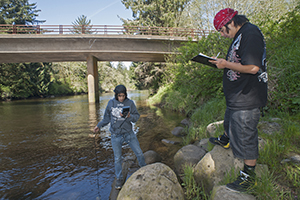
Northwest Indian Fisheries Commission
Gaspar Ramos, 16, strides confidently to the edge of the Quillayute River and drops a hydrolab datasonde that measures water quality parameters into the water. The Quileute tribal member has worked with the water quality equipment enough to look like he has been doing it for years.
Ramos might one day have a job just like it if the introduction by the Quileute Natural Resources and the North Olympic Peninsula Skills Center Natural Resources program creates an interest in pursuing education needed for natural resources work. The Skills Center offers project-based field science classes and work on real-world projects in local ecosystems. The Quileute Tribe provides the jobs for the two tribal students to shadow as well as do project work.
The ideal pathway is that the next step is an internship, that provides paid education awards through AmeriCorps, followed by college or a job,” said Dan Lieberman, the coordinating teacher for the Skills Center Natural Resources, headquartered in Port Angeles.
The students spend half a day a week, outside of regular class hours, working with the tribe and the Skills Center Natural Resources program. Ramos and Jonah Black work on water quality and job skills assignments with Nicole Rasmussen, water quality biologist for the Quileute Tribe. They also are introduced to other jobs and shadow other biologists in tribal natural resources.
We’ve always had a core mission to attract tribal students to working in natural resources jobs,” said Frank Geyer, assistant director of Natural Resources for the Quileute Tribe. “We’re happy to have the Skills Center Natural Resources program as another partner in our efforts of getting tribal students out to see what jobs are available here and how it applies to their treaty rights.”
The Skills Center Natural Resource program has been working in the Forks area for less than a year, but began in Port Angeles five years ago. It now serves all five school districts in Clallam County and provides students opportunities to obtain high school and sometimes college credit by working with a variety of natural resource organizations like tribes, Olympic National Park, Olympic National Marine Sanctuary and area timber companies.
For students like Ramos, the work provides an opportunity to design their own scientific questions and methods to answer them on the job. He has been measuring the salinity levels of various spots in the Quillayute River system and making predictions based on the results. “It’s interesting. When I was little, I would always see people on the river doing experiments, so I asked them what they were doing. They told me they didn’t like sitting in the office much and that their job allowed them to be outside a lot,” Ramos said. “That sounded like a good idea to me, too.”
